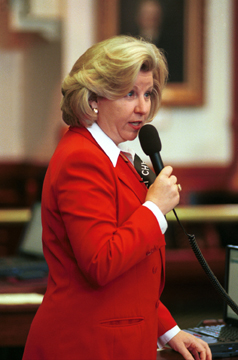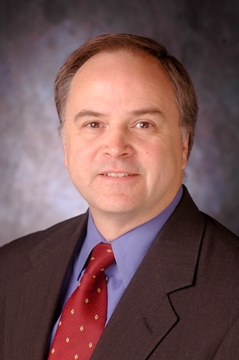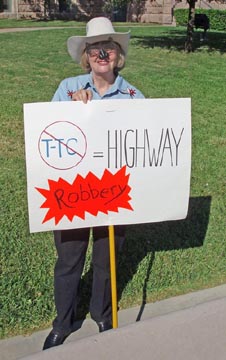 Many in the audience, including dozens of legislators of both major political parties, couldn’t help wondering whether someone had replaced Republican Gov. Rick Perry with a body double, complete with the correct helmet of well-coiffed hair, but with somebody else’s audiotape playing. Money for cancer research? More money for education? A mandatory vaccination for sixth-grade girls for a sexually transmitted disease that can cause cervical cancer? Austin American-Statesman columnist W. Gardner Selby a couple of days later wondered in print if Perry or a look-alike might have been channeling Chris Bell, the Democratic runner-up to Perry in November. Bell, after all, had pledged to work for the mandatory vaccination for human papilloma virus, or HPV, last September.
Many in the audience, including dozens of legislators of both major political parties, couldn’t help wondering whether someone had replaced Republican Gov. Rick Perry with a body double, complete with the correct helmet of well-coiffed hair, but with somebody else’s audiotape playing. Money for cancer research? More money for education? A mandatory vaccination for sixth-grade girls for a sexually transmitted disease that can cause cervical cancer? Austin American-Statesman columnist W. Gardner Selby a couple of days later wondered in print if Perry or a look-alike might have been channeling Chris Bell, the Democratic runner-up to Perry in November. Bell, after all, had pledged to work for the mandatory vaccination for human papilloma virus, or HPV, last September.
If others were confused, the heavy-set guy in the southwest corner of the House chamber wasn’t. Dave Carney may have been clapping the loudest. He’s the chief political consultant to Gov. GoodHair (as the late, great columnist Molly Ivins usually referred to Perry) and the guy suspected of putting dreams of the vice presidency in Perry’s head. That’s the job that several legislators thought Perry seemed to be auditioning for last week. Some Democrats said parts of Perry’s speech, like paying health insurance costs for two million uninsured Texans who earn less than 200 percent of the federal poverty level, and spending $80 million to expand the state’s pre-kindergarten program, sounded more like they were written for a Democrat than a Republican. Perhaps the governor was trying to appear a bit more moderate — though not too moderate.
For instance, he also bragged in the speech, indirectly, about helping cut the legs out from under plaintiffs’ attorneys who sue insurance companies, doctors, and businesses on behalf of injured consumers, by saying he’d helped make the climate better for doctors and other healthcare providers. On the other side of the aisle, some Republican legislators were still reeling from Perry’s surprise executive order Feb. 2, four days before his speech, to require the HPV vaccinations. Although Perry repeated his support for the vaccinations in his speech, noting that parents of girls can choose to keep their daughters from being inoculated, it didn’t allay criticism from many in his own party. Republicans are steamed that Perry didn’t include them in discussions before taking the action unilaterally, especially since bills have been introduced in both houses of the legislature to do the same thing.
Several attorneys have questioned the constitutionality of his actions. And folks all over the political waterfront have pointed out that the HPV vaccine is manufactured by pharmaceutical giant Merck — whose lobbyists in Texas include Perry’s friend and former chief of staff Mike Toomey. Merck’s political action committee has donated $6,000 to Perry’s political treasury. The Democrats whose jaws were already unhinged dropped their molars even farther when Perry said he wanted to spend more state money on health insurance, to leverage three federal dollars for each two state dollars spent. Same with his strong call to spend earmarked state tax and fee money for the purpose for which it was collected — like the sporting goods tax for state parks. Was this the same governor whose insistence on tax cuts in 2003, when the state was already facing a budget shortfall, forced legislators to shift money from pocket to pocket, in order to make the money cover as many bases as possible? Was he now blaming them for bookkeeping sleight of hand?
And it’s Texas Democrats, not Republicans, in general, who have long advocated spending more state dollars on health insurance to bring more federal dollars to Texas and who have resisted the practice of spending money collected for one purpose for other things. Then there was Perry’s call for more money for public and higher education. Most Democrats and some Republicans think the governor’s tightfistedness in 2003 was what put schools in a hole in the first place. It’s now as if the blocks he caused to be taken down four years ago, in areas like the Children’s Health Insurance Program (CHIP), parks, higher education, and other areas, he’s now calling to have put back. How would he fund all these programs? In part, by yet another proposal — bold or hare-brained, depending on your point of view — to sell the state’s lottery to a private company for $14 billion to $20 billion and invest the money. Problem is, other state leaders, including House Speaker Tom Craddick, question whether that route would produce even as much money for the state treasury each year as the lottery itself does now.
In short, the governor in the past week has managed to start new brushfires that are turning up the heat he’s been taking for months now over everything from schools to the massive toll roads he has pushed to the coal-fired plants that he supports, even though business leaders, a mayors’ coalition, and environmentalists from around the planet have been cautioning that the plants could seriously affect global warming and air pollution. Perry seems undaunted by all the opposition. Maybe it’s because, in addition to having visions of Air Force 2 dancing in his head, he wants, belatedly, to leave behind some legacy other than a tax cut four years ago that wounded many key state services. After all, if he finishes out what will probably be his last term, he will have been one of the longest-serving governors in Texas history. If he plans on leaving before the end of the term for higher office, however, all the new ideas he’s been popping out might hurt rather than help him. A majority of the Texas Senate — including members from both parties — has gone on record opposing his vaccination fiat. One state senator from his own party is asking that he be investigated for overstepping his powers. Some legislators are working this session to back the state off from both the coal plant fast-track and the Trans-Texas Corridor. And, as one leading toll road opponent — a Republican — said recently, people concerned about that issue alone have been working since November “to make sure he is useless to the national party.”
Legislators were trying to track the new math of Perry’s proposals — sell the lottery, invest the proceeds, spend them on various proposals here, create a new fund there — and, by the way, cut property taxes again by another $2.5 billion. A lot of them didn’t like where it appeared to lead. “Down here I’ve learned to follow the money,” said State Sen. Eliot Shapleigh, an El Paso Democrat. “If the priority is health, education, jobs, and children, then why is a tax cut in 2010-2011 the top priority? We can’t cover one million children with CHIP if state leaders want to give almost $3 billion in tax cuts to Texans who make over $100,000. What matters more — tax cuts for the wealthy or CHIP for children?” What it adds up to, some suggested, is a roller-coaster that has kept the state’s budget in continuous upheaval for the last four years. Take another Perry proposal from his speech, this one for $40 million for a Texas Technology Grant Program. It was Perry, after all, who decreed in 2003 that the Telecommunications Infrastructure Fund, fed by telephone surcharges passed on to customers, was no longer needed. That program was designed to help schools, libraries, and hospitals across the state with technology development.
 In 2003, Perry did support keeping some of that money for technology for students. But legislators, in trying to balance the budget, redirected the fund’s $200 million-plus in annual income to other purposes — and have continued that habit since then. Equally befuddling to some was the governor’s proposal that Texas follow two other states in investigating the sale of their lotteries. He proposed using the presumed $14 billion selling price — and later said the price might reach $20 billion — to set up permanent funds to provide help with health insurance for the uninsured, to provide a cancer research trust, and to increase the permanent endowment fund for public schools. Perry predicted such funds would produce annual investment earnings of $750 million for education, $270 million for cancer research, and $243 million to help with insurance policies for the working poor. But several legislators, including Craddick and Lt. Gov. David Dewhurst, the senate’s presiding officer, said that proposal in fact wouldn’t provide as much as the $1 billion-plus that the lottery brings in every year for public education. “We’ll look at it, but the people voted to have the lottery used on public education,” Dewhurst told reporters.
In 2003, Perry did support keeping some of that money for technology for students. But legislators, in trying to balance the budget, redirected the fund’s $200 million-plus in annual income to other purposes — and have continued that habit since then. Equally befuddling to some was the governor’s proposal that Texas follow two other states in investigating the sale of their lotteries. He proposed using the presumed $14 billion selling price — and later said the price might reach $20 billion — to set up permanent funds to provide help with health insurance for the uninsured, to provide a cancer research trust, and to increase the permanent endowment fund for public schools. Perry predicted such funds would produce annual investment earnings of $750 million for education, $270 million for cancer research, and $243 million to help with insurance policies for the working poor. But several legislators, including Craddick and Lt. Gov. David Dewhurst, the senate’s presiding officer, said that proposal in fact wouldn’t provide as much as the $1 billion-plus that the lottery brings in every year for public education. “We’ll look at it, but the people voted to have the lottery used on public education,” Dewhurst told reporters.
Rep. Elliott Naishtat added that the state’s track record with privatization has been spotty, especially the bad results from farming out to privately run call centers the process of signing up Texans for social services programs. “Many questions concerning another privatization remain to be answered,” the Austin Democrat said. Some see Perry’s call to sell the lottery as a way for him to find easy funding now, without new taxes, for programs for which he can take credit — even though Texas would forgo profits from the lottery for the next 40 years. That sounds similar to another program the governor’s been pushing that has property owners and others in an uproar all across the middle of Texas — the area where the massive Trans-Texas Corridor is planned. Perry just waved at toll roads in his state-of-the-state speech. “Our state is building roads faster than any state in the nation,” was all he said, without mentioning how they are being financed or that they have tens of thousands of Texas thoroughly hacked. A whole list of grassroots groups opposed to the Trans-Texas Corridor have sprung up, opposing the taking of nearly a million acres of land for toll roads that would, in effect, be leased long-term to a foreign corporation that would build the roads and then get to keep all profits from them for decades. The project also includes charging tolls to drive on highways that are now free — and could prevent any projects to improve many other state roads in the same area as the TTC.
Some other state officials are working to slow down the relentless push by Rick and Ric, the Toll Road Warriors. The second Ric — no K for him — is Ric Williamson of Weatherford, the governor’s buddy from their days as freshmen House members from adjoining districts in 1985. Williamson currently chairs the Texas Department of Transportation Commission, considered the driving force behind the toll road effort, and has managed to anger enough legislators with what they say is his arrogance that they wish he was gone. Sen. John Carona, a Dallas Republican and chairman of the Senate Committee on Transportation and Home Security, recently called for Perry not to reappoint Williamson. Critics of the TTC and other Perry initiatives say their math shows that, were it not for Perry’s anti-tax stance, Texas could have funded its highway needs — and other responsibilities — without resorting to extraordinary tactics like making free highways into toll roads and leasing new highways to foreign corporations. Those folks say the no-tax hype, pushed by people like Grover Norquist, the Jack Abramoff buddy whose group solicits pledges from politicians to vote against all tax increases, has crimped the state’s ability to raise funds to meet its needs.
One such area is the state gasoline tax, which hasn’t been raised for 16 years. In 2001, a nickel increase on the tax was proposed by Rep. Clyde Alexander, an Athens Democrat, who has since retired, and Republican Rep. Kip Averitt of Waco, who is now a state senator. A nickel increase that year, they said, would have brought revenue in inflation-adjusted dollars up to not quite what the current 20 cents per gallon produced in 1991, the last time the gas tax was increased. The nickel hike in 2001 would have produced an additional $650 million a year: $487.5 million for transportation, and 60 percent of that for highways. Schools would have gotten $162.5 million. But in 2001, the governor threatened to veto any new tax, which killed the idea from the start. So the state got toll roads instead. Since then, the Trans-Texas Corridor has brought together some unlikely and vehement allies, from conservative ranchers to those on either end of the political spectrum who oppose the hugely expanded use of eminent domain in recent years — a coalition, in fact, not unlike that opposed to Perry’s HPV initiative.
After six years in office, Perry is used to making Democrats mad. But when he surprised state lawmakers with his executive order that 11- and 12-year-old schoolgirls be inoculated against a disease transmitted solely by sexual conduct, the firestorm of criticism from his own party — and support from some outside his party — may have surprised even him. State Sen. Jane Nelson of Lewisville, the Republican who chairs the Senate Health and Human Services Committee, said she was “absolutely stunned.” She and Republican State Rep. Jim Keffer of Eastland have asked Attorney General Greg Abbott for an opinion on whether Perry has the power to issue such an executive order. “The public has a right to testify on this issue, and the legislature has a constitutional duty to be involved in this decision,” Nelson said. Other critics said the vaccine has not been tested enough and that it could make the state look like it’s endorsing young girls having sex. Perry ordered that Gardasil, a vaccine produced by Merck, be administered to the young girls to help cut down on the incidence of cervical cancer associated with HPV. He reiterated his support for the order in his speech four days later, with his wife Anita, a nurse, beside him at the podium.
 Democrats and some Republicans, including Cathie Adams, president of the conservative Texas Eagle Forum, are suspicious that Perry issued the order as much to benefit Toomey and Merck as for public health reasons. The huge pharmaceutical company, trying to recover from losses associated with Vioxx, reportedly has called on its lobbyists around the country to try to get the drug mandated in every state. “I understand the concern some of my great and dear friends have about requiring this vaccine, which is why parents can opt out if they so choose,” Perry said in his speech. “But I refuse to look a young woman in the eye 10 years from now who suffers from this form of cancer and tell her we could have stopped it, but we didn’t. … Others may focus on the cause of this cancer. I will stay focused on the cure.” His words didn’t stop 26 of the 31 members of the Senate, including some supporters of the vaccinations, from signing a letter to Perry calling on him to rescind his action. And 31 House members, mostly Republicans, echoed that action.
Democrats and some Republicans, including Cathie Adams, president of the conservative Texas Eagle Forum, are suspicious that Perry issued the order as much to benefit Toomey and Merck as for public health reasons. The huge pharmaceutical company, trying to recover from losses associated with Vioxx, reportedly has called on its lobbyists around the country to try to get the drug mandated in every state. “I understand the concern some of my great and dear friends have about requiring this vaccine, which is why parents can opt out if they so choose,” Perry said in his speech. “But I refuse to look a young woman in the eye 10 years from now who suffers from this form of cancer and tell her we could have stopped it, but we didn’t. … Others may focus on the cause of this cancer. I will stay focused on the cure.” His words didn’t stop 26 of the 31 members of the Senate, including some supporters of the vaccinations, from signing a letter to Perry calling on him to rescind his action. And 31 House members, mostly Republicans, echoed that action.
Bills have been introduced by Republicans in both the House and Senate to overturn the order. And bills had been introduced before Perry’s executive order by two Democrats, Rep. Jessica Farrar of Houston and Sen. Leticia Van de Putte of San Antonio, calling for the same action Perry ordered — though only after legislative debate on the topic. Both women applauded Perry’s action as “a bold step toward eradicating cervical cancer and saving lives.” State Rep. Donna Howard, an Austin Democrat and a nurse, also endorsed the move. Van de Putte pointed out that those who have sex outside marriage aren’t the only women who would be helped by the vaccine. Married women could still get HPV from their husbands. “It’s not about having sex or not having sex,” she said. “It prevents cancer.” In fact, about the only praise Perry got from legislators came from Democrats, some but not all healthcare groups — and the Democrat who challenged Perry last fall and lost, former U.S. Rep. Chris Bell of Houston.
“While I continue to be very disappointed in the overall direction he is taking our state, in this particular instance Rick Perry has done the right thing,” Bell said in a statement. “This is about protecting women’s health, not about politics.” He pointed out that the FDA has approved the vaccine and predicts it could have prevented about 70 percent of cervical cancers that killed almost 400 women in Texas last year. “This is why the Center for Disease Control and the American Cancer Society recommend that all young women age 11-12 get vaccinated, and it’s why I called for this same action during the campaign,” he said. Much of the argument turns not on the question of whether the vaccine is beneficial, but whether, particularly with the legislature in session, the issue should have gone through the legislative process, including public hearings. Two veteran attorneys — Buck Wood, who represented 250 poor school districts in the suit seeking more state money for schools, and Scott McCown, a former state district judge who now heads the Center for Public Policy Priorities — said Perry’s move defies the Texas Constitution.
“The governor has exceeded his authority for two different reasons,” McCown said. “One, the governor is asserting that if there is authority anywhere in the executive branch, he can order those executives to do anything he wants. For example, he could order the Texas A&M board of regents to make everyone join the corps, or to disband the corps. That’s what he’s arguing.” However, he said, the current Texas Constitution specifically parcels out authority on various matters to other offices, “so the governor couldn’t tell those executives what to do.” Second, McCown said, “he can’t order something to be done that violates the law. We have a process for making rules. It’s just as wrong for the governor to say ‘I’m not following the rule-making process; I’m just making a rule,’ as it would be for a judge to say, ‘I’m not holding a trial; I’m just finding you guilty.’ Because we have a whole process for making rules that includes public testimony, legislative input, and so on, and he’s just skipping all that.”
 Rules, the former judge said, are intended to implement existing law, not expand it. That’s one reason, he said, that “the legislature requires a state agency to go through a careful process of evaluating its legal authority before adopting a rule.” Republican Sen. Glenn Hegar of Katy has said he would withhold support for Perry’s re-appointment of Albert Hawkins as commissioner of health and human services until Hawkins explains how he would deal with the governor’s inoculation order. Hegar also is concerned that the vaccine should not be used on pregnant women. “Does that mean the commissioner intends to require a pregnancy test for each of these young children before they receive the Gardasil HPV vaccine, or does he intend to put these children at undue risk instead?” he asked in a statement. The battle over the HPV vaccine may be just beginning. But the fight against another Perry fiat has reached the courthouse as well as the legislature, and it’s being watched closely by folks all over the world.
Rules, the former judge said, are intended to implement existing law, not expand it. That’s one reason, he said, that “the legislature requires a state agency to go through a careful process of evaluating its legal authority before adopting a rule.” Republican Sen. Glenn Hegar of Katy has said he would withhold support for Perry’s re-appointment of Albert Hawkins as commissioner of health and human services until Hawkins explains how he would deal with the governor’s inoculation order. Hegar also is concerned that the vaccine should not be used on pregnant women. “Does that mean the commissioner intends to require a pregnancy test for each of these young children before they receive the Gardasil HPV vaccine, or does he intend to put these children at undue risk instead?” he asked in a statement. The battle over the HPV vaccine may be just beginning. But the fight against another Perry fiat has reached the courthouse as well as the legislature, and it’s being watched closely by folks all over the world.
Groups across the state are massing against the new coal-fired power plants that Perry has put on the fast track for approval. As with HPV, Perry last April issued an executive order that cut down on the time for public debate on the proposed plants — 19 in all. Critics in Texas and across the country believe that the plants will add dangerously to the state’s production of carbon dioxide, a key component in global warming. Texas already produces more carbon dioxide than any other state and most countries. TXU and other utilities have said the air-pollution effect of the plants will be neutral. Perry said in his recent speech that “power outages are just a few years away” if Texas doesn’t act to build more power plants — and that the new plants will reduce emissions. Environmentalists disagree vehemently.
Whether for that reason or others, a bipartisan Clean Air Caucus has sprung up this year in the Legislature, with 39 of 150 House members, Republicans and Democrats, signed up thus far. Its purpose is to protect public health and the business climate, meet federal clean-air standards, encourage renewable resources, and closely analyze the permitting process for large emission generators — presumably, including the coal plants being pushed by TXU and other utilities. State Rep. Lon Burnam of Fort Worth has filed a bill to create a task force to study global warming in Texas. Burnam is also one of a bipartisan group of co-sponsors of House Concurrent Resolution 34, authored by Rep. Charles “Doc” Anderson of Waco, that urges the Texas Commission on Environmental Quality to place a 180-day moratorium on the coal-fired plants.
Proposals like the coal-plant push and the HPV vaccine order have helped create Republican-Democrat coalitions that the governor probably wasn’t talking about when he made a plea for bipartisanship toward the end of his state-of-the-state speech. He asked that listeners put aside past disputes to “choose the high road of unity rather than the easy course of cynicism.” That’s a tall order for the considerable number of Democrats who remember that in 2003, in addition to the stingy spending that threw hundreds of thousands of kids off CHIP and shorted the schools, it was Perry who called three special sessions on congressional redistricting, designed to punish well-seasoned Democratic members of Congress. They remember that it has been Perry, with lots of campaign contributions from multimillionaire school voucher supporter James Leininger of San Antonio, who has been advocating that state school money be spent on private school vouchers, despite the fact that most of the Democratic legislators and a sizable number of Republicans oppose vouchers for fear they’ll drain resources and good students from public schools. And it’s even tougher when many of them suspect that many of the current gargantuan controversies they and the rest of Texas are wrestling with — HPV, the toll roads, the coal plants, school funding, and the rest — are at least partly window dressing for a vice-presidential bid.
 Despite the flurry of speculation, Perry spokesman Robert Black said the governor has no eyes on the VP prize. “He’s not interested,” Black said. “I don’t know how he can say that any better. He’s said he doesn’t like Washington. There’s a lot more talk about that outside the governor’s office than inside it.” As for all the governor’s recent initiatives, Black said they’re not unusual. “This state-of-the-state wasn’t any more or less ambitious than previous ones — just maybe different.” In January 2006, Perry was asked, and declined to say, whether he would serve his full four-year term if re-elected. The following month, he made a trip to Washington, D.C., ostensibly to seek more federal aid to Texas, but also to see and be seen by national power brokers. As if he didn’t have enough on his plate in Texas, Perry lately has started sounding interested in political problems around the globe. After all, one feather often needed for a national-ticket headdress is some familiarity with foreign affairs. In his inaugural speech in January, Perry mentioned Israel, Iraq, the Middle East, the Sudan, Asia, Africa, Europe, and Latin America — and, of course, Mexico. Then in the speech this month, the governor decided to join others in “protesting the ethnic genocide occurring in Darfur by calling on the state of Texas to divest of companies doing business in Sudan.”
Despite the flurry of speculation, Perry spokesman Robert Black said the governor has no eyes on the VP prize. “He’s not interested,” Black said. “I don’t know how he can say that any better. He’s said he doesn’t like Washington. There’s a lot more talk about that outside the governor’s office than inside it.” As for all the governor’s recent initiatives, Black said they’re not unusual. “This state-of-the-state wasn’t any more or less ambitious than previous ones — just maybe different.” In January 2006, Perry was asked, and declined to say, whether he would serve his full four-year term if re-elected. The following month, he made a trip to Washington, D.C., ostensibly to seek more federal aid to Texas, but also to see and be seen by national power brokers. As if he didn’t have enough on his plate in Texas, Perry lately has started sounding interested in political problems around the globe. After all, one feather often needed for a national-ticket headdress is some familiarity with foreign affairs. In his inaugural speech in January, Perry mentioned Israel, Iraq, the Middle East, the Sudan, Asia, Africa, Europe, and Latin America — and, of course, Mexico. Then in the speech this month, the governor decided to join others in “protesting the ethnic genocide occurring in Darfur by calling on the state of Texas to divest of companies doing business in Sudan.”
Don’t be too surprised if Perry visits some or all of those places over the next several months. Just sightseeing, of course. Even with Perry kissing issues like vaccines and tax cuts and power plants like so many babies held out to him on the campaign trail, ponder his chances in 2008: He was re-elected in November with just 39 percent of the vote, in a state the Republicans think they’ll carry anyway, at a time when Americans seem to have had their fill of politicians from Texas. And if Republicans thought they did need a Texan on the presidential ticket, might not U.S. Sen. Kay Bailey Hutchison, with 13 years experience in national issues, stand a better chance for a post-primary selection as a VP candidate? Somewhere around June of 2008, if he’s still holding down the job, Perry will break the record for most consecutive years as Texas governor, which now stands at eight years. (Four of his predecessors have served six years — though the total service of the fourth, one George W. Bush, was short a month of that because he resigned in December 2000 to accept the presidency, leaving the governor’s mansion open for Perry.) In late December 2008, he’d set a new record for total years served.
Perry could get to follow Bush’s path to Washington. Or he may get to break those records and serve a full 10 years in the governor’s office — whether he wants to or not.
Dave McNeely covered Texas politics for the Austin American-Statesman for 26 years. He continues to write a weekly newspaper column and is co-writing a book on the late Lt. Gov. Bob Bullock with former Dallas Times-Herald writer Jim Henderson.
You can contact him at dmcneely@austin.rr.com.











